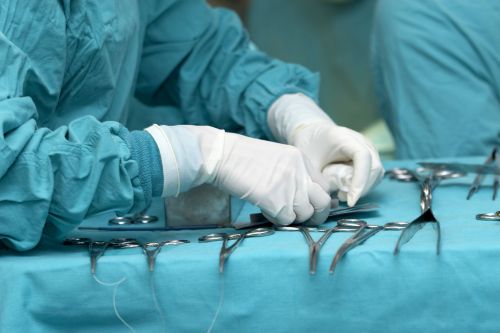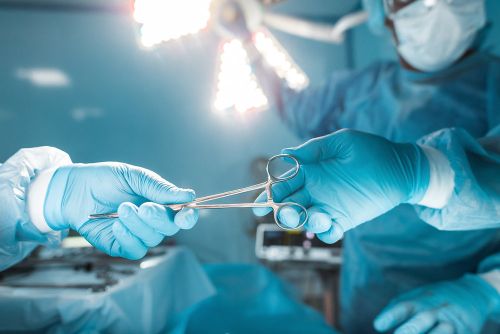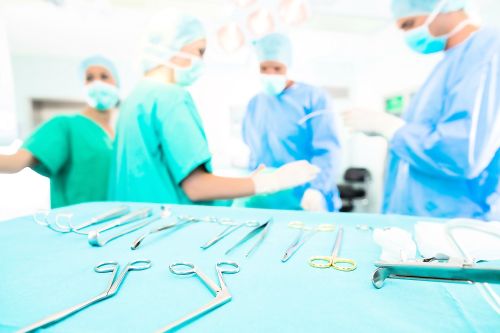It is a surgical procedure performed to treat tears in the anal area. These tears usually occur as a result of constipation and strain. Anal fissure surgery accelerates the healing process by allowing the anal muscles to relax. It is generally performed under local or general anesthesia. After surgery, patients can return to their daily activities in a short time.
In Which Situations Is Anal Fissure Surgery Performed?
 If an anal fissure persists for more than 8-12 weeks and does not heal despite medical treatments (medication, dietary changes, stool softeners, etc.), surgical intervention may be necessary. Chronic fissures often become deeper and cause pain. If the patient's previous anal fissures recur, surgical option should be considered. Recurrent fissures can significantly impact a patient's quality of life. Anal fissure surgery may be recommended for patients suffering from severe and persistent pain. This type of pain can negatively affect daily living activities. Some patients experience discomfort long enough to require surgery to heal their fissure. If the patient cannot improve, surgical options should be considered. Sometimes anal fissure may occur together with other anal diseases (e.g. hemorrhoids, anal abscess). In these cases, surgical intervention may be necessary to improve the overall course of the disease. Anal fissure surgery is usually performed to repair the fissure or relax the anal sphincter muscles. This type of intervention can reduce the patient's symptoms and improve quality of life. The decision for surgery is made by the specialist, taking into account the patient's condition.
If an anal fissure persists for more than 8-12 weeks and does not heal despite medical treatments (medication, dietary changes, stool softeners, etc.), surgical intervention may be necessary. Chronic fissures often become deeper and cause pain. If the patient's previous anal fissures recur, surgical option should be considered. Recurrent fissures can significantly impact a patient's quality of life. Anal fissure surgery may be recommended for patients suffering from severe and persistent pain. This type of pain can negatively affect daily living activities. Some patients experience discomfort long enough to require surgery to heal their fissure. If the patient cannot improve, surgical options should be considered. Sometimes anal fissure may occur together with other anal diseases (e.g. hemorrhoids, anal abscess). In these cases, surgical intervention may be necessary to improve the overall course of the disease. Anal fissure surgery is usually performed to repair the fissure or relax the anal sphincter muscles. This type of intervention can reduce the patient's symptoms and improve quality of life. The decision for surgery is made by the specialist, taking into account the patient's condition.
How is Anal Fissure Surgery Performed?
 The patient's general health condition is evaluated before the operation. Laboratory tests and imaging methods can be used if necessary. Before the surgery, the patient's intestines are cleaned. The surgery is usually performed under local anesthesia or general anesthesia. Which anesthesia method will be used depends on the patient's health condition and the surgeon's preference. Fissure excision is the process of cutting and removing the fissure along with the surrounding tissues. This allows the wound to clean and heal. Internal sphincterotomy aims to relieve tension by cutting the inner muscles of the anus. This method helps heal the fissure and reduces pain. In some patients, fissure treatment can be applied using the laser method. The laser can speed healing by cutting tissue in a minimally invasive way. After anal fissure surgery, patients are usually kept under observation for a few hours. After discharge, it is important to follow the doctor's recommendations. During this process, drinking plenty of fluids, consuming fibrous foods and avoiding straining during defecation will accelerate the healing process. After the surgery, the patient's condition is monitored regularly. Follow-up appointments are important to ensure that the healing process continues in a healthy manner.
It gives successful results and improves the quality of life in most patients. However, like every surgical intervention, this surgery has some risks. Therefore, all possible situations should be discussed in detail with the doctor before surgery.
The patient's general health condition is evaluated before the operation. Laboratory tests and imaging methods can be used if necessary. Before the surgery, the patient's intestines are cleaned. The surgery is usually performed under local anesthesia or general anesthesia. Which anesthesia method will be used depends on the patient's health condition and the surgeon's preference. Fissure excision is the process of cutting and removing the fissure along with the surrounding tissues. This allows the wound to clean and heal. Internal sphincterotomy aims to relieve tension by cutting the inner muscles of the anus. This method helps heal the fissure and reduces pain. In some patients, fissure treatment can be applied using the laser method. The laser can speed healing by cutting tissue in a minimally invasive way. After anal fissure surgery, patients are usually kept under observation for a few hours. After discharge, it is important to follow the doctor's recommendations. During this process, drinking plenty of fluids, consuming fibrous foods and avoiding straining during defecation will accelerate the healing process. After the surgery, the patient's condition is monitored regularly. Follow-up appointments are important to ensure that the healing process continues in a healthy manner.
It gives successful results and improves the quality of life in most patients. However, like every surgical intervention, this surgery has some risks. Therefore, all possible situations should be discussed in detail with the doctor before surgery.
Things to Consider After Anal Fissure Surgery
 Cleaning the area after surgery is extremely important. It should be cleaned gently after each toilet. Hygienic products should be used to reduce the risk of infection. Cleaning with warm water can reduce irritation in the area. Mild or moderate pain is normal after anal fissure surgery. Regular use of painkillers recommended by the doctor helps control the discomfort. If the pain becomes severe or unbearable, a doctor should be consulted immediately. A balanced nutrition plan plays an important role in the recovery process. Consuming fiber-rich foods (vegetables, fruits, whole grains) softens the stool and prevents straining during the toilet. It is also important to drink enough water. Toilet habits may change after surgery. If necessary, the desire to go to the toilet should be expected and forcing should be avoided. Sitting or straining for long periods of time can negatively affect healing. It is important to allow time for the body's healing process. Rest helps the body recover. Excessive physical activity should be avoided and rest periods should be taken into consideration. Attending regular doctor check-ups is critical to monitoring the recovery process. In case of any problems or complications, early intervention can be provided. Stress can negatively affect the healing process. Methods such as relaxation techniques and meditation help manage stress. It is important to consider these important points after anal fissure surgery. It will accelerate the healing process of patients and help them have a comfortable process. In case of any problem or concern, you should definitely contact your doctor.
Cleaning the area after surgery is extremely important. It should be cleaned gently after each toilet. Hygienic products should be used to reduce the risk of infection. Cleaning with warm water can reduce irritation in the area. Mild or moderate pain is normal after anal fissure surgery. Regular use of painkillers recommended by the doctor helps control the discomfort. If the pain becomes severe or unbearable, a doctor should be consulted immediately. A balanced nutrition plan plays an important role in the recovery process. Consuming fiber-rich foods (vegetables, fruits, whole grains) softens the stool and prevents straining during the toilet. It is also important to drink enough water. Toilet habits may change after surgery. If necessary, the desire to go to the toilet should be expected and forcing should be avoided. Sitting or straining for long periods of time can negatively affect healing. It is important to allow time for the body's healing process. Rest helps the body recover. Excessive physical activity should be avoided and rest periods should be taken into consideration. Attending regular doctor check-ups is critical to monitoring the recovery process. In case of any problems or complications, early intervention can be provided. Stress can negatively affect the healing process. Methods such as relaxation techniques and meditation help manage stress. It is important to consider these important points after anal fissure surgery. It will accelerate the healing process of patients and help them have a comfortable process. In case of any problem or concern, you should definitely contact your doctor.


